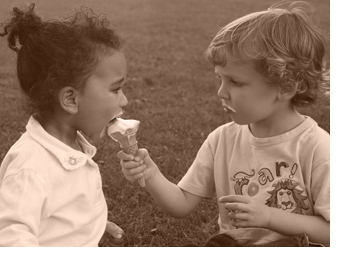
Sharing Doesn't Hurt
May 19, 2015—Preschoolers already recognize what it feels like to be left out when goodies are being shared. In a new study, Researchers at Ludwig-Maximilians-Universitaet (LMU) in Munich show that 3-year-olds can anticipate negative feelings in others, and adjust their own behavior in response.
Why are we willing to share with others what we could just as well keep for ourselves? Willingness to allot a portion of a coveted resource to someone else is a behavioral pattern that can throw light on the origins and development of prosocial modes of response during childhood. In a new study, LMU's Markus Paulus (Professor of Developmental Psychology and the Psychology of Learning in Early Childhood) and Professor Chris Moore of Dalhousie University (Halifax, Nova Scotia) have now shown that whether or not preschoolers choose to let another child partake of a valued commodity that they control depends on how well they can anticipate how that child is likely to feel should they decide not to do so. The results appear in the online edition of the journal Social Development.
The authors of the study asked pre-school children of different ages to imagine how they feel, or another child would feel, depending on whether someone shares with them or not. It emerged that their understanding of what it feels like to be left out when everyone else has received his or her share not only differs from one individual to the next, it also has an impact on their readiness to share with others in their turn. "The children who had a greater awareness of how badly one feels when others fail to share with one were more generous in a subsequent resource allocation task."
Learning to be generous
The study involved 82 participants between the ages of three and six years, who were divided into three groups. The children in the first group were individually asked by the experimenter to think about how they feel when another person shares things with them or not, and to rate their emotions using a set of pictures showing a range of sad-to-happy facial expressions. The members of the second group were asked to imagine what another child might feel in the same situation. The children were then given colored stickers to share with each other and with another child (represented only as a picture). The responses of the two groups in the resource allocation task were then compared to those of a control group, consisting of children who had been asked simply to infer another's child's state of knowledge in a situation without emotional overtones.
"A heightened awareness of the emotional consequences of being shared with, or not, has an influence on one's own generosity," says Paulus. "The children who had been encouraged to think about the emotions associated with being left empty-handed when some resource has been allocated to others proved to be more generous than those in the control group." Moreover, anticipating— and wishing to avoid—the disappointment caused to another child by being left out was a stronger incentive to generosity than the idea of making the recipient happy. "One possible explanation for this is what is called 'negativity bias,' which implies that our behavior is more strongly influenced by the desire to avoid negative emotions then by a wish to provoke positive ones," Paulus adds.
The study also showed that even three-year-olds were capable of anticipating what another might feel if ignored in a round of sharing. The degree to which this capacity was present varied between individuals in all age groups tested. Learning in the first two or three years of life is very strongly influenced by our emotions. Studies done by others have, for example, indicated that children whose parents talk to them about feelings are better able to anticipate another child's emotional state, says Paulus. His own latest work shows how one can foster children's readiness to share with others: "It helps if one makes clear to them what someone else feels when left out."
LUISE DIRSCHERL
ARTICLE:
"Preschool Children's Anticipation of Recipients' Emotions Affects Their Resource Allocation," Markus Paulus and Chris Moore. Social Development. first published online : 13 MAY 2015, DOI: 10.1111/sode.12126.
